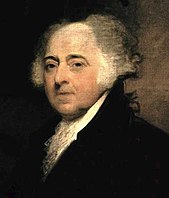XYZ affair
The XYZ affair was a diplomatic scandal that lasted from March 1797 to 1800. Three representatives of the French side, originally known only as X, Y and Z but later revealed as Jean Conrad Hottinguer , Pierre Bellamy and Lucien Hauteval , demanded huge concessions from the United States as a condition for the continuation of bilateral peace negotiations. The terms set by the French officials included £ 50,000 , a $ 12 million loan from the United States and a $ 250,000 bribe to French Foreign Secretary Charles-Maurice de Talleyrand . A formal apology was also requested from President John Adams for anti-French remarks.
The demands arose during a meeting between the French representatives and an American delegation consisting of Charles Cotesworth Pinckney , John Marshall and Elbridge Gerry . A few weeks before the meeting with X, Y and Z, the American delegation met Talleyrand in Paris to discuss countermeasures by France based on the Jay Treaty , which France saw as evidence of an Anglo-American alliance. In the Atlantic Ocean , the Caribbean and the Mediterranean , the French had previously captured nearly 300 American ships that were on their way to British ports. The dispatch of Pinckney was a bold move by Adams as Franco-American relations deteriorated after Talleyrand refused to recognize Pinckney as US envoy to France. France continued to hijack American ships and the Federalist Party in America advocated war.
The American delegates considered the French demands to be unacceptable and replied: “ Not a sixpence ” (in German: “Not a penny”). But in the exaggerated rhetoric of those days it became the much more memorable “ Millions for defense, sir, but not one cent for tribute! "(In German:" Millions for defense, sir, but not a cent as a tribute! "). However, recent evidence suggests that this slogan has largely not been adopted.
The United States offered France many of the same concessions that were in the Jay Treaty with Great Britain. However, France responded by sending Marshall and Pinckney back to America and rejecting any proposal in which these two delegates were involved. Gerry, who hoped to prevent a declaration of war, stayed in France. Officially, however, he no longer negotiated.
A month later, President Adams issued the report on the affair, which sparked strong anti-French resentment in America. In 1798 a declaration of war was imminent. However, it was avoided through Adams' diplomacy, specifically the appointment of new diplomats such as William Vans Murray to defuse the conflict. Despite diplomatic efforts and the lack of a formal declaration of war, further attacks on American merchant ships led to the termination of the Franco-American alliance, and the United States and France were in what was known as quasi-war from July 7, 1798 to 1800 . On January 18, 1799, Adams sent more negotiators to France, which ultimately ended hostilities in the Treaty of Mortefontaine of September 30, 1800.
During the negotiations with France, America began to build up its navy . This move had long been pursued by Adams and Marshall in order to defend themselves against France and Great Britain. Adams announced in a speech on July 16, 1797 his intention to expand the army and navy . He also pointed out the importance of renewing the alliances with Prussia and Sweden .
literature
- Udo Sautter : Lexicon of American History. CH Beck, Munich 1997, p. 411 (on books.google.de )
- William Stinchcombe: The XYZ Affair. Greenwood Press, Westport (Connecticut) 1980
- John William Kuehl: The quest for identity in an age of insecurity: the XYZ affair and American nationalism. University of Wisconsin, Madison 1968 (on books.google.de )
- Carol Berkin, Christopher Miller, Robert Cherny, James Gormly: Making America: A History of the United States. Volume 1, Cengage Learning, 2007, p. 213 (on books.google.de )
Web links
- The XYZ Affair and the Quasi-War with France, 1798-1800. Summary of the XYZ affair on the website of the US State Department (English)

